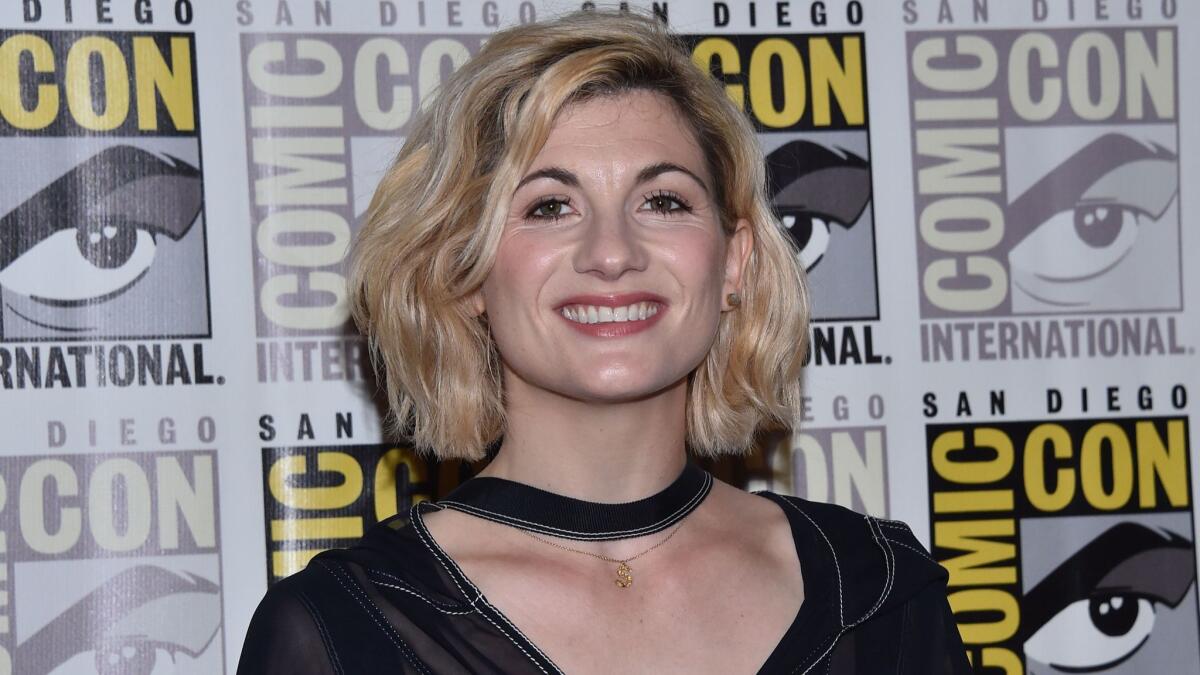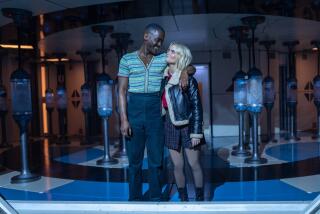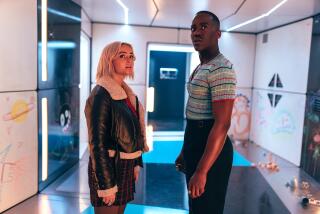Jodie Whittaker meets the Comic-Con masses as ‘Doctor Who’ enters a new era

- Share via
Picture a doctor. Who do you see?
The question is part of a 2016 study designed by Harvard researchers to uncover unconscious gender bias, and now that idea will again be put to the test as the venerable British sci-fi series “Doctor Who” will, for the first time in 55 years, see its lead character portrayed by a woman, Jodie Whittaker.
The 11th season, arriving this fall on BBC America, marks a long-overdue shift for a time-traveling show whose central character has the power to regenerate into any new body, a conceit that’s allowed it to remain fresh in its various reinventions over the years. Stateside, the show is freshly adored by its cult-ish following since it was revived in 2005 after 16 years off the air.
Before Whittaker’s casting, the show had managed to cycle through a dozen doctors before finally, in the age of inclusion riders and #TimesUp, allowing for a shift to female perspective with No. 13. But when asked whether she would bring a “woman’s touch” to the Doctor, Whittaker demurred.
FULL COVERAGE: Comic-Con 2018 »
“I have never approached a role thinking of it as ‘how would a woman play this role?’ because I just am one. And I don’t know if a guy has ever gone, ‘How would a guy do this scene?’” she said during a press conference before the show’s Thursday morning panel in Hall H at Comic-Con in San Diego. “But the best thing about the Doctor is I’m not playing either [gender]. I’m an alien, so there’s really no rules.”
That said, the significance of Whittaker making the role her own was not lost on her. “It’s an amazing moment,” she said. “And not one I thought would happen. As a girl born in the ’80s, the Doctor didn’t look like me.”
However, the shift has not come without controversy. While various surveys online and otherwise indicated a mostly positive response among fans, some didn’t appreciate a revision to the ever-changing “Doctor Who” they knew.
Some swore they would abandon the show as they took to Twitter to protest under the hashtag #RIPDoctorWho, while others used the more overtly sexist #nursewho. For his part, previous showrunner Steven Moffat, who presided over the Matt Smith and Peter Capaldi eras, dismissed any uproar generated online or otherwise at last year’s Comic-Con panel, where he expressed a wish for journalists examining the backlash to “shut the hell up.”
However, the casting of Whittaker also wasn’t decided by Moffat, whose tenure with the show ended after last season when Capaldi exited. It was Chris Chibnall, who came to the show from the BBC crime drama “Broadchurch” (which featured Whittaker), who was behind the decision.
“It was possibly overdue, to be honest,” said Chibnall during the same press conference. “It felt really simple and obvious. The world was ready, the show was ready, the fans were ready. There had been lots of mentions of [regenerations from male to female] in shows before so in terms of canon you can point to things.”
While Moffat had described a female doctor as an eventuality prior to his departure (and introduced a new character, Michelle Gomez’s Missy, who was the Doctor’s childhood friend), some of his comments leading up to the new season’s premiere have been puzzling. In an interview with the U.K.’s Radio Times, Moffat sounded wary of alienating the audience of the series, saying “Doctor Who” wasn’t “exclusively for progressive liberals; this is also for people who voted ‘Brexit.’ That isn’t me politically at all but we have to keep everybody on board.”
Chibnall spoke of diversity being a priority behind the camera as well with this season featuring the show’s first writers of color as well as women on the writing staff and as episode directors. “It should be the most inclusive show on television,” he explained. “The whole concept of ‘Doctor Who’ is anybody can go anywhere.”
And Whittaker wasn’t the only one who traveled across oceans for Comic-Con. Caitlin Shephard, 15, traveled with her from Sydney, Australia. “It’s interesting, it’s really different. I’m really excited,” said Shephard, who was dressed in a bright blue T-shirt bearing the show’s familiar TARDIS phone booth. “I think it might be a bit more sassy,” her mother, Carla, added with a grin. (Unfortunately, both mother and daughter were turned away from the show’s crowded panel.)
Inside Hall H in the Convention Center later that morning, the mood was celebratory. The cast and crew entered to a substantial ovation, and Whittaker was welcomed with an affecting BBC video that showed delirious fans reacting to the initial announcement interspersed with well-wishing celebrities. “About bloody time,” “Game of Thrones” star Emilia Clarke said, a sentiment later echoed by Meryl Streep.
“She just walked into the room and she was the Doctor,” Chibnall told the Hall H fans of Whittaker, who had no trouble winning over the crowd to the idea.
After the panel debuted a new teaser for the upcoming season, the audience Q&A began. Two fans — male fans — exemplified the pull of the new season by separately approaching the mic in the sporty, rainbow-striped T-shirt and gold suspenders of Whittaker’s Doctor. “Nice costume,” she said to one. “Comfy, isn’t it?”
Another fan, a young girl, introduced herself by saying, “My name is Amelia and I’ve actually been waiting for a girl Doctor for a very long time.” A cheer rippled across Hall H. “You’ll make me cry,” Whittaker said.
“It’s a new, different take,” said Fernandito Eugenio of San Diego, 41, just prior to the presentation. He has attended Comic-Con for 10 years, and became a “Doctor Who” fan when David Tennant took over the role in 2005. “It’s always been a male Doctor with a female companion so there’s been that tension there — the Doctor did say us humans are too hung up on sex, that was one of his lines in one of the episodes.
“I’m very interested to see how they push the narrative of the story forward,” he added.
Follow me over here @chrisbarton.
ALSO:
More to Read
The biggest entertainment stories
Get our big stories about Hollywood, film, television, music, arts, culture and more right in your inbox as soon as they publish.
You may occasionally receive promotional content from the Los Angeles Times.











